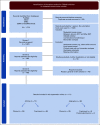Systematic Review of Molecular Biomarkers Predictive of Resistance to CDK4/6 Inhibition in Metastatic Breast Cancer
- PMID: 35005994
- PMCID: PMC8769124
- DOI: 10.1200/PO.21.00002
Systematic Review of Molecular Biomarkers Predictive of Resistance to CDK4/6 Inhibition in Metastatic Breast Cancer
Abstract
Cyclin-dependent kinase 4 and 6 (CDK4/6) inhibitors have revolutionized the treatment of hormone-positive metastatic breast cancers (mBCs). They are currently established as standard therapies in combination with endocrine therapy as first- and second-line systemic treatment options for both endocrine-sensitive and endocrine-resistant mBC populations. In the first-line metastatic setting, the median progression-free survival for the three currently approved CDK4/6 inhibitors, palbociclib, ribociclib, and abemaciclib, with aromatase inhibitors is greater than 2 years (palbociclib 27.6 months; ribociclib 25.3 months; and abemaciclib 28.18 months). Although CDK4/6 inhibitors have significant clinical benefits and enable physicians to delay starting chemotherapy, they are expensive and can be associated with drug toxicities. Here, we have performed a systemic review of the reported molecular markers predictive of drug response including intrinsic and acquired resistance for CDK4/6 inhibition in mBC. The rapidly emerging molecular landscape is captured through next-generation sequencing of breast cancers (DNA with or without RNA), liquid biopsies (circulating tumor DNA), and protein analyses. Individual molecular candidates with robust and reliable evidence are discussed in more depth.
Conflict of interest statement
Figures



References
-
- Hortobagyi GN, Stemmer SM, Burris HA, et al. : Updated results from MONALEESA-2, a phase III trial of first-line ribociclib plus letrozole versus placebo plus letrozole in hormone receptor-positive, HER2-negative advanced breast cancer. Ann Oncol 29:1541-1547, 2018 - PubMed
-
- O'Leary B, Finn RS, Turner NC: Treating cancer with selective CDK4/6 inhibitors. Nat Rev Clin Oncol 13:417-430, 2016 - PubMed
Publication types
MeSH terms
Substances
LinkOut - more resources
Full Text Sources
Medical

